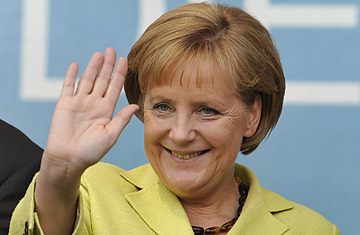
German Chancellor Angela Merkel waves farewell to the crowd following an election-campaign rally in Kassel on Sept. 21, 2009
This may come as a surprise, but with just days to go before the German parliamentary election, the suspense is building. For the past four years, Germany has been governed by a so-called Grand Coalition of the two biggest parties in parliament: the center-right Christian Democrats (CDU) and the center-left Social Democrats (SPD). Angela Merkel, the German Chancellor and leader of the CDU, hopes to drop her current partners and govern instead with the liberal Free Democrats (FDP). But a tight electoral race and the complexity of the German voting system mean that outcome is far from certain.
Germans refer to the possible coalition combinations not by the parties' names but by their colors. Thus Merkel, whose party color is black, is said to be aiming to replace the current black and red (for the SPD) government with an alliance of black and gold (the FDP's color). But if her party fares badly on Sunday, Sept. 27, a multihued coalition may emerge: a "traffic-light" alliance of SPD, FDP and the Greens, or even a "Jamaica" grouping of CDU, FDP and the Greens, named after the colors of the Caribbean nation's flag. Both smaller parties have ruled these options out, but they may well change their minds after the elections. The dark-red color of Die Linke (the Left), an amalgamation of former East German communists and disgruntled SPD members, is not expected to feature in any potential lineup.
So far, so garish. The real excitement comes from the unpredictability of the outcome. It's not just that opinion polls show the CDU and FDP tantalizingly close to attaining just under half the votes they'd need to form a government. A few percentage points could change the picture entirely. But Germans don't even know how many politicians will get elected, since the Bundestag is one of the few parliaments in the world where the number of seats can shift with each election.
Germany's electoral system is a combination of proportional representation and simple plurality voting. This means that half the Bundestag members are elected through direct voting in 299 districts and half are awarded seats according to their party's share of the overall vote. Oftentimes, one party wins more seats in the direct vote than it earns from its share of the overall vote; when that happens, the party is allowed to keep its extra seats, which are called überhangmandate, or overhanging mandates, and the number of seats in parliament changes.
Confused? Probably not as much as the candidates who start popping champagne corks election night only to crash to defeat. In 2002, the CDU looked set to secure a big enough share of the vote to overtake the SPD and oust the incumbent coalition of SPD and Greens. Polling stations closed at 6 p.m., and the CDU started celebrating as television broadcasters published the results of exit polls that seemed to confirm its victory. At 6:47 p.m., Edmund Stoiber, the leader of the CDU's Bavarian sister party the Christian Social Union (CSU) and a Chancellor candidate for both, declared himself the winner. "One thing is clear already," he said, beaming. "The CDU, the CSU — we have won the election!" And so it seemed, based on the tally of existing seats the Christian Democrats had snared. But when the official results came in later that night, it became clear that the CDU and CSU parties had actually picked up only one extra seat, while the SPD had claimed four. Even though confusing situations such as this sometimes arise, the major parties resisted moves in July to reform (in essence, abolish) the extra-seat rule, which Germany's Constitutional Court has demanded happen by 2011 at the latest.
So this year's election could be just as exciting, even though the CDU leads the SPD by a much more substantial margin than it did in 2002 — by as many as 11 points, according to the most recent polls. Denied a majority with the FDP, Merkel could opt to retain the Grand Coalition or try to rope in an additional party. (Remember the "Jamaica" scenario?) Building a coalition — an elaborate dance of horse-trading and arm-twisting — could take several weeks.
And the final partnership is of significance far beyond Germany's borders. Under a black-and-gold government, Germany — the world's fourth-largest economy and second-biggest exporter — could embark on pro-market reforms and an overhaul of its tax, business and employment laws. Black and red means a continuation of the careful (some would say overcautious) politics of the past four years. Whatever the outcome, this election will be more interesting to watch than many in years past, if only to find out which colors will be en vogue this fall in Berlin.
